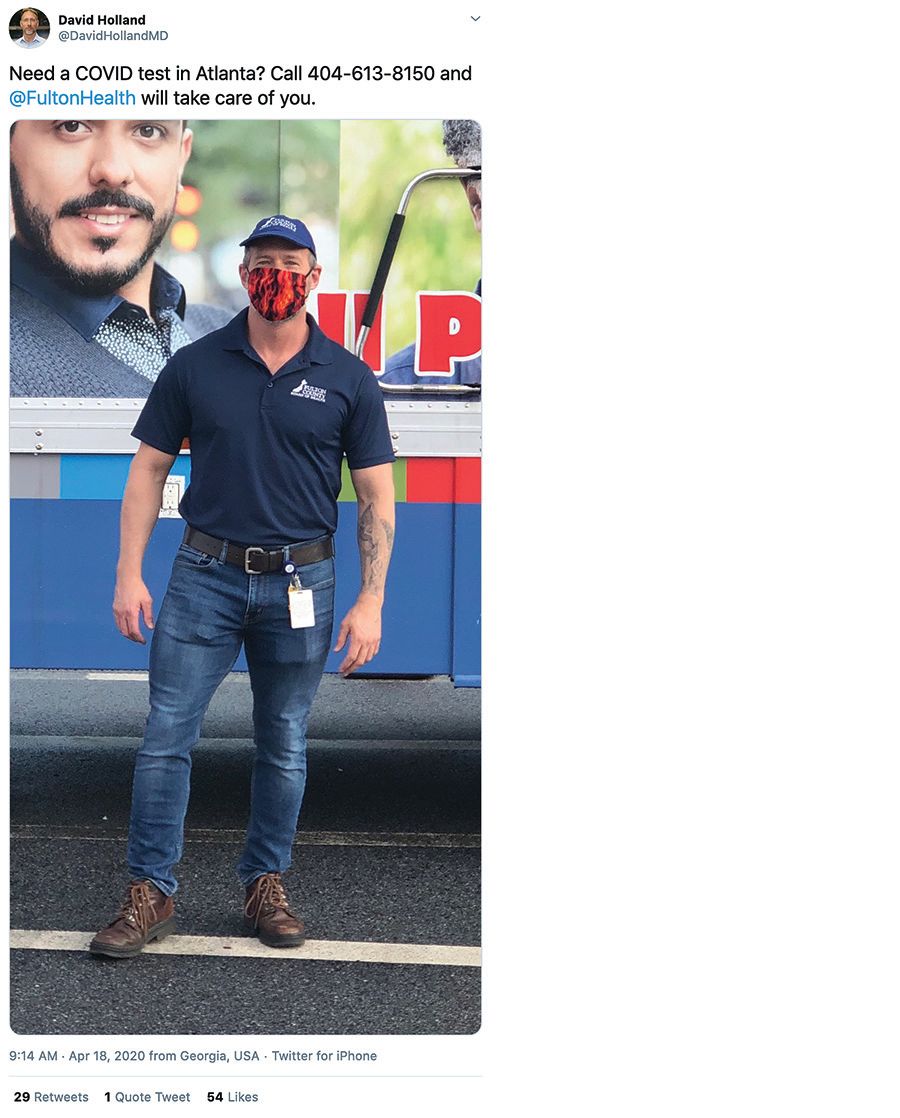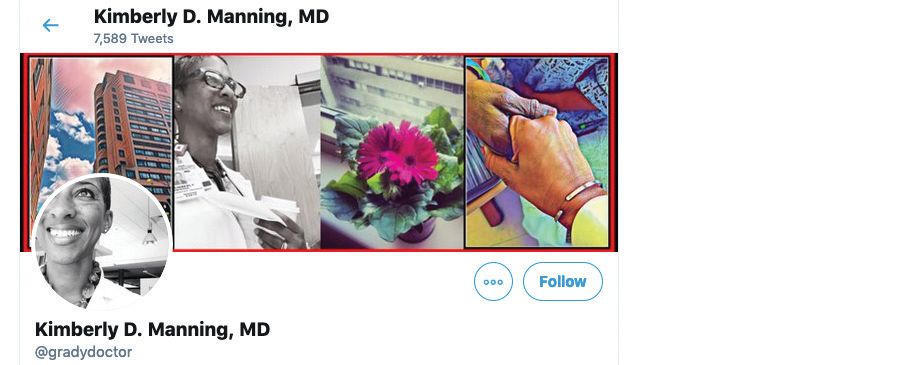CUTTING THROUGH THE CHAOS
Emory medical experts provide clarity and science-based guidance

During the pandemic, School of Medicine faculty have been called on to write op-eds, appear on live news broadcasts, and serve as expert advisers. They’ve turned home offices into temporary studios and used social media to get health facts out. Here are just a few of our public scholars:

| CARLOS DEL RIO
Executive Associate Dean for Emory at Grady Memorial Hospital, Carlos del Rio, Distinguished Professor of Medicine in the Division of Infectious Diseases and professor of global health and epidemiology in Rollins School of Public Health, is a sought-after expert on COVID-19.
And he doesn’t pull any punches on what he sees as the mishandling of the pandemic in this country. “While this is heartbreaking, what has to be said over and over is that this did not need to happen,” he says. “What drops my stomach through the floor is the irresponsible political leadership during this pandemic that has us in a crisis.”
From appearing live on CNN and MSNBC’s “The Rachel Maddow Show,” to coauthoring several viewpoint articles on the novel coronavirus in the Journal of the American Medical Association, to serving on the National Collegiate Athletic Association’s (NCAA) COVID-19 advisory panel, to his more than 33,000 followers on Twitter, del Rio doesn’t back away from challenging misinformation and calling out poor decisions.
This is not the first pandemic del Rio has battled publicly and clinically. Since his days as a physician in training, del Rio has worked to reduce the spread of HIV on multiple fronts, directing the NIH-sponsored HIV Prevention Trials Network at Emory and codirecting the Emory Center for AIDS Research. He also serves as Foreign Secretary of the National Academy of Medicine.
Del Rio has turned his office into a broadcast studio of sorts, with improved lighting and an abstract painting of lungs on the wall behind him, painted by his daughter. “She did a series some years ago on the organs—the lungs, the heart, and the brain—which I loved. Now it turns out they are the three organs most impacted long term by COVID-19.”
He understands the power of social media to reach people directly. Del Rio has done several Facebook live webinars and tweets nearly every day. Del Rio’s tweets sometimes highlight an upcoming media engagement: “Will be joining @JohnKingCNN in @CNNPolitics tomorrow to talk about how quickly a vaccine can be approved, public trust about safety and questions of political pressure on @US_FDA to fast track a #SARSCoV2 vaccine before the election.”
Or he may simply remind people of basic protective measures: “As health care workers, we are tired, we are frustrated, and we are mad. If March–April was a wave this is a tsunami and could have been prevented. Please everyone #WearAMask #WatchYourDistance & #WashYourHands.”—Mary Loftus
| SANJAY GUPTA
Perhaps the Emory physician with the most airtime during the pandemic is Associate Professor of Neurosurgery Sanjay Gupta, CNN’s chief medical correspondent and host of “Sanjay Gupta MD,” for which he has won multiple Emmy awards. Gupta continues to see patients as a general neurosurgeon at Grady Memorial in Atlanta.
He is a frequent contributor to numerous CNN shows covering the crisis, and hosts a weekly town hall with CNN anchor Anderson Cooper.
Each week, on CNN Health, the father of three answers kids’ questions about COVID-19, such as “Why do some people get the coronavirus but don’t feel sick?” and “When can I hang out with Grandma and Grandpa again and not have to worry about giving them coronavirus?”
Gupta also hosts a “Coronavirus: Fact or Fiction” podcast, (cnn.com/audio/podcasts/corona-virus) where he covers such topics as frontline workers at the breaking point, Doctors without Borders helping American nursing homes, and how this pandemic compares with the 1918 influenza pandemic.
As a trusted medical journalist, viewers look to Gupta for understandable medical explanations and implications of the ever-evolving discoveries about COVID-19, such as the recent finding that up to 35 percent of Big Ten athletes who had the virus now show signs of heart inflammation. “This is pretty frightening,” he says, before describing the fact in more detail.
Gupta (@drsanjaygupta on Twitter) sees his role as “setting the record straight” on inaccurate information that is circulated, much of the time on social media.
“Since I started reporting on the coronavirus, I’ve heard a lot of myths and theories about it. The outbreak has unleashed so much information, the World Health Organization has called it an infodemic. And there’s so much misinformation that goes along with it.”
One specific appearance by Gupta on the big screen has gone viral—when he portrayed himself in the 2011 movie Contagion. “In one scene, Dr. Sanjay Gupta is featured on a TV news program discussing preventive measures [against a fast-spreading, lethal virus]. Now, nine years later, he’s doing it for real on CNN,” says an article in Variety.—Mary Loftus
| DAVE HOLLAND
Associate Professor of Infectious Diseases David Holland spent years working on HIV, tuberculosis, sexually transmitted infections, and viral hepatitis with the Fulton County Board of Health. “The strongest public health agencies in the US maintain strong connections with academia, and I am very grateful to be in this position,” he says.
But when the novel coronavirus pandemic came to the US, Holland’s role as chief of Medical and Preventive Services for Fulton County pivoted to focus on COVID-19—a disease that would need to be managed through testing and contact tracing, with no vaccine available.
“In a lot of ways this was not a pandemic that we planned for,” says Holland, who oversees the board’s COVID-19 testing activities. But they adapted. Holland said that by July, the Board of Health and its partners were testing up to 25,000 people per week at fixed and mobile sites within the county.
“We’re hoping sometime in the not-too-distant future, we’ll be able to convert testing [sites] to vaccine administration.”
Holland’s work during the HIV crisis taught him a crucial lesson: The most effective testing strategy is to engage the community from the start. “For any sort of intervention to work,” he says, “it has to be something that is meaningful to the people.
Working closely with minority communities that experience disproportionate impact from disease, Holland says, is a responsibility to which public health agencies have recommitted during this time of national awareness of systemic racism.
“I’m proud to work for two organizations—Fulton and Emory—that are engaged in definitive anti-racist activities, particularly around health care,” he says. “We can never achieve any of our goals in public health until we assure health equity for everyone.”—Emily Weyrauch
| NADINE KASLOW
Professor of Psychiatry and Behavioral Sciences Nadine Kaslow is often called on by the media to comment on effective coping strategies during times of crisis. So, understandably, she has been called on frequently during the pandemic, by everyone from CNN to Georgia Public Broadcasting.
She has written op-eds for CNN.com, done Q&As on social media on the topic of mental health and COVID-19, and speaks about how children are being impacted by COVID-19.
It's really, really hard on kids. And they don't developmentally have the same coping strategies as adults do. There's no way they can."
Kaslow suggests families have at least one meal together a day and “try to build in pleasurable activities. I do think our kids are picking up on our anxieties, so we need to be mindful of that. . . . Now is the time to say, ‘I’ll bet this must be hard for you, not getting to see your friends.’ Be patient and tolerant, and remember what our kids need most from us right now is our love.”
Kaslow is often called on to help health care providers who are stressed or experiencing PTSD. At Emory she launched a series of support groups—Caring Communities for COVID Caregivers—held in ICUs and hospital units treating COVID-19 patients. The groups use a peer- support framework to help medical workers share coping strategies.
Kaslow and her colleagues also run support groups for medical workers who have tested positive for COVID-19 and for those who are grieving. In addition, she has partnered with the World Health Organization–Africa and the US Department of State to offer education, guidance, and support to frontline medical providers in Africa and other regions with a shortage of mental health care providers.
She encourages everyone to embrace compassion. “All of us having to change our normal routines is extremely stressful, and we’re all scared of getting sick and dying or losing people we care about,” Kaslow says. “I think escapism is absolutely fine, even if it involves Netflix and snacks. Be easy on yourself as well as those around you.”—Mary Loftus
| COLLEEN KRAFT
Associate Professor of Infectious Diseases and Pathology Colleen Kraft is no stranger to pandemics. Five years ago, she played a lead role in treating Ebola patients who came to Emory during the 2014–16 outbreak. Now she’s helping to coordinate her hospital’s response to COVID-19 as an associate chief medical officer at Emory University Hospital.
Kraft is helping to shape the national conversation—and public health policies—on the coronavirus pandemic. She’s made appearances on CNN, NBC, and NPR programs; written op-ed pieces; and was profiled in the Los Angeles Times and the AJC. Kraft also was named to the NCAA COVID-19 advisory panel, and serves on Georgia Governor Brian Kemp’s coronavirus task force.
“I’ve learned to enjoy this public-facing aspect of the job. I look at these opportunities as a way to get the truth about COVID-19 out there to as many people as possible."
Kraft says she works hard to try and make challenging topics understandable and accessible, yet, “I’m not afraid to challenge the audience with a little bit more complexity than most people usually see on social media and the news. It’s a different form of teaching for me, on a larger scale.”
When stress is running high, she does what many of us do: “I read novels. I try to get some exercise or a walk in every day. And I love spending time with my kids. We’ve been watching Disney’s 'The Mandalorian.' It’s a fun, grounding ritual, because everything else is so upside down right now. Most important, when we’re together, we try not to talk about the coronavirus.”—Kelley Freund and Roger Slavens
| KIMBERLY MANNING
Professor of Medicine Kimberly Manning decided for her birthday this year, she wanted one thing: to raise money for Grady Memorial Hospital in downtown Atlanta.
So she posted on social media: “2020 has been a year that many of us would soon prefer to forget. Along with all the tragedy, I am reminded that this year also includes two major milestones in my life: the start of my 20th year as a Grady doctor, and my 50th year. My birthday dream: To raise $50,000 for the Grady Health Foundation, specifically targeting the Grady COVID-19 Response Fund. Given the disproportionate impact that COVID-19 has had on the Black community, this is personal to me. I hope you’ll let it be personal to you, too.”
Manning’s Twitter handle is @gradydoctor, and for the past 11 years, she’s been writing the blog “Reflections of a Grady Doctor,” in which she tells about her experiences as a physician and clinical educator with honesty, poignancy, and humor. It was named a top medical blog by O, the Oprah Magazine. She has more than 50,000 followers on Twitter. “I impulsively decided to start a blog,” says Manning, who joined Emory’s faculty in 2001 after training at Case Western Reserve’s MetroHealth Medical Center in internal medicine and pediatrics.
“In my time at Grady, I’ve realized just how much magic is happening there and how much humanity is inside. But that isn’t what people see when they turn on the news. I tell stories that show the positive and beautiful aspects of a safety-net hospital.”
If Manning experiences something that impacts her, “particularly if the person is underrepresented in medicine, I’m going to use my position to get that voice out. I care about diversity, equity, inclusion, and humanizing patients who are underserved. I care about kindness. If that’s something that makes someone an influencer, I think we can all be influencers.”—Camile Matthews
| INGRID PINZON
Assistant Professor of Hospital Medicine Ingrid Pinzon, a physician at Emory Saint Joseph’s Hospital, became concerned when she saw a jump in younger Hispanic patients coming into the hospital with COVID-19. Many had no underlying health conditions but “because they came in sicker, they developed more complications,” she says.
Indeed, like other people of color, Latinos and Hispanics are more likely to contract COVID-19. While making up 19% of the US population, they make up nearly 31% of all US COVID-19 cases.
Because language can be a barrier for teaching Spanish-speaking residents how to protect themselves from the virus, Pinzon and other bilingual Emory Healthcare physicians are working to reach Atlanta’s Latinx community, reaching out to them in areas where they live, work, shop, and socialize, and making signs with prevention tips in Spanish. “This population needs specific guidelines in Spanish, I think that’s the key,” Pinzon told Fox5 Atlanta.—Mary Loftus
| JAY VARKEY
Associate Professor of Infectious Diseases Jay Varkey was also on Team Ebola, helping to care for the first Ebola patients on US soil in 2014, in the serious communicable diseases unit at Emory University Hospital. Varkey, a hospital epidemiologist, addressed how lessons from Ebola can help fight COVID-19 in US News & World Report: “The first is that caring for a patient with COVID-19 is clearly a team sport.
“Certainly, there’s been a lot of focus on frontline health care workers within the hospital itself, but given how prevalent this infection is, it’s really impacted everyone, including those who keep our hospital environments safe by cleaning up every day in areas where there is environmental contamination, where they are putting themselves at risk."
“The last piece where there’s a really important parallel with Ebola is that the key to preventing COVID-19 is strict adherence to basic infection prevention principles. Personal protective equipment, or PPE (such as masks, gloves, gowns), works. It’s strict attention to the basics that keeps us safe.”
Varkey has done a series of Q&As on social media called “COVID-19: What You Need to Know,” with his ever-present Batman costume draped with a stethoscope in the background. He’s answered questions on vaccine, therapies, and school openings on SiriusXM with Olivier Knox. He’s active on Twitter (@jaybvarkey), mixing in a good dose of humor with COVID science and medical information.
And he has appeared on CNN Newsroom, where he said on February 27, near the beginning of the pandemic: “This notion of community spread is not a reason to panic, it’s a reason to prepare.”—Mary Loftus
Illustration Wendy Darling




